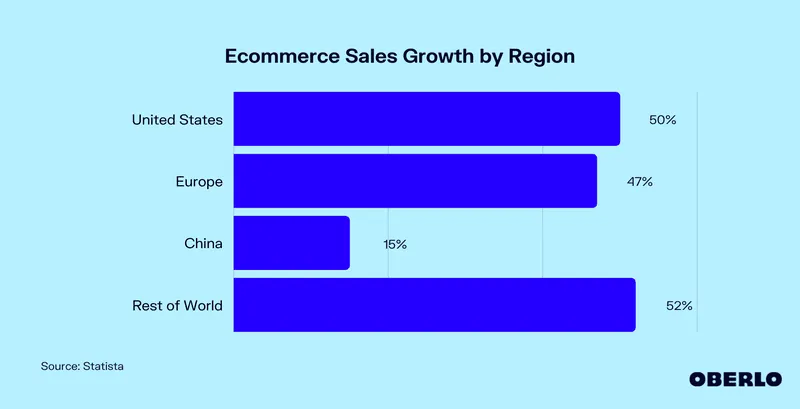Ecommerce Careers: The Top 12 eCommerce Jobs to Consider in 2026
Interested in a career in eCommerce? Want to get more experience but not sure how? Here are the hottest eCommerce jobs to check out in the industry.
Updated November 6, 2024

Ecommerce is one of the hottest industries globally.
Ecommerce sales experienced a massive spike in 2019-2020 as a result of the pandemic and have now leveled back to normal levels. Yet, there is still significant growth predicted for the future. In 2022 alone, eCommerce sales are forecast to increase by 9% globally, and 50% in the US from $907 billion to $1.4 trillion.
A few factors that affect sales are:
- More businesses are utilizing online channels since the pandemic
- High gas prices are making people order online rather than travel to physical stores
- Increased availability of eCommerce platforms and easy-to-use software
If you're considering a career in eCommerce and want to learn what types of eCommerce jobs are out there, then this post is for you.
What are eCommerce jobs?
Ecommerce specifically refers to running a business that sells products or services online. The various roles in an e-commerce business could include customer service, operations, warehouse, fulfillment, back office, digital marketing, product development or sourcing, and logistics.
Why look for an eCommerce job right now?
As we said before, eCommerce is projected to grow 50% in the US just this year, so there is tremendous growth opportunity in this field in the long term.
The average salaries in the eCommerce sector are pretty high.
Also, most eCommerce brands are small and it's easy to learn a wide range of skills and have experience with different parts of the business, in an intimate friendly environment.
Do you need a bachelor's degree for an eCommerce job?
You absolutely don't need to have a college degree to work in eCommerce. If you want to get a more specialized role in product development or graphic design then previous experience would be required, but not a 4-year degree. You may not even need a school diploma.
For most eCommerce roles you need to have soft skills like customer service, sales, attention to detail, communication skills, analytical skills, and organization. They are pretty common skills you could get anywhere else. So switching to eCommerce is pretty easy.
Are there entry-level eCommerce jobs available?
Yes, there are a ton of entry-level jobs in the eCommerce sector. You could get an entry-level job in marketing, online sales, customer satisfaction, or operations pretty easily.
Especially if the eCommerce company is pretty small, you could start managing a particular marketing channel and then become a marketing manager or eCommerce specialist and begin to manage marketing strategy for a number of channels.
Types of eCommerce jobs to consider in 2022
The hottest careers in eCommerce can be divided into 3 areas - operations, marketing, and design.
Director of eCommerce
At the top of any eCommerce business is a person who manages the entire sales, marketing, and product teams. They can be called an eCommerce manager or the director of eCommerce.
What's required for the job is a lot of soft skills to be able to lead teams, experience creating a digital marketing strategy and managing marketers, and previous success managing e-commerce businesses. This role usually only exists for medium to large-sized businesses and more established brands.
Operations Manager
Operations have to do with warehouse management, supply chain management, inventory, product sourcing, and shipping/fulfillment. An Operation Manager’s job will include managing 3PLs and custom warehouse solutions as the products will be stored across the US in many different warehouses (to speed up fulfillment).
Inventory management and automation will become even more complex and eCommerce brands will require more and more expertise in this area. Another trending skill is product sourcing and product development. This role is central to the growth of the business and will continue to be popular.
Marketing Manager
This role involves managing all the digital marketing activities of a brand. It may not require a degree in marketing because employers are more likely to look for someone that has successful experience in running digital marketing campaigns and in managing a marketing team.
A marketing manager at an eCommerce brand can manage a variety of people including:
- SEO content writer
- Google Analytics expert
- Digital strategy expert
- PPC expert
- Email marketer
- Social media manager
- Growth marketer
» Looking for an expert to drive your growth plan? Explore the best growth hackers for hire
Digital Marketer
Marketing will include data analysis, online community development, influencer management, and advertising on apps, marketplaces, and social media platforms.
Brands used to have small marketing teams of 3-5 people that could manage everything but with the increasing complexity of marketing channels and omnichannel strategies, teams are growing to 30-50 employees.
Graphic Designer
As more brands create content and start acting like media companies, designers are becoming more and more central to the operation.
In the future, we will see more brand designers, animation designers, product & packaging design, and much more. This is one area that doesn’t lend itself well to automation so these jobs will continue to be popular and in high demand.
Content Writer
Content is another super critical role for an e-Commerce brand. Content marketing in eCommerce could include writing product descriptions, optimizing product listings on other digital platforms and online marketplaces (like Amazon or Walmart), and publishing blog posts and shopping guides.
An SEO content writer tends to have a higher focus on optimizing content for search engines, in what's called search engine optimization or SEO.
PPC Manager
Most e-Commerce stores use a combination of Facebook ads, Amazon Ads, and Google Ads (particularly Google Shopping campaigns) to promote their products. There are a ton of opportunities in pay-per-click advertising for eCommerce brands.
Product Manager
A product manager is someone that is in charge of developing new products. They take customer feedback and see how they can improve existing products. They are also in charge of sourcing new products,
Customer Service Representative
Customers want to interact with live reps on the phone or via chat so every brand needs a good customer service team. Studies show that 1 in 3 customers will leave a brand after just one bad experience so customer loyalty is absolutely key to having long-term growth and getting more referral business.
The customer rep is there to create positive customer experiences so they need to have high attention to detail, be a team player, and exhibit empathy.
eCommerce business analyst
Analytics is a big part of any business, especially in eCommerce where there's a lot of seasonality. An eCommerce business analyst is a great position in a medium to large-sized company and it involves using marketing analytics tools (like Google Analytics) to analyze the marketing mix and see which channels are underperforming.
An analyst can also help with the commercial side of the business as a whole. Commercial analytics involves looking at the inventory, the sales, how many sales each product gets, and seeing what needs to be ordered.
eCommerce order clerk
This position involves processing the orders that come in, solving customer service issues, doing returns, and refunds, and communicating with the shipping and fulfillment team. It can be an office position and can be in a warehouse, depending if the e-commerce business does its own fulfillment or has an outside solution.
eCommerce virtual assistant
The primary duties of a VA in the eCommerce world are the same as any other industry but could include some fulfillment, customer communication, and order processing depending on the size of the company.
There could also be hands-on activities like speaking with suppliers, sourcing new products, tracking shipments, and communicating with fulfillment providers.
Takeaways
Ecommerce is booming, jobs are opening up, and more direct-to-consumer brands are starting to break through than ever before. So, what are you waiting for? Already a marketer but not sure if you qualify to work in eCommerce? Join our community and ask around.
FAQs
What is the future of the eCommerce industry?
Ecommerce will continue to boom worldwide. Ecommerce sales are predicted to reach $1 trillion by 2022 and continue to rise by double digits. New delivery options like curbside pick-up and new delivery technologies will continue to create more jobs and expand the industry both in the US and worldwide.
Regional and international expansion is going to get easier and more firms are going to take advantage of it and grow across state and country lines. The demand for talent is going to increase and now is a good time to jump in and get started in this industry.
Do eCommerce jobs pay well?
Yes, eCommerce jobs pay really well. Here are the average salaries of various eCommerce positions:
- eCommerce marketing manager - $71,436
- eCommerce marketing specialist - $50,051
- eCommerce content manager - $57,436
- eCommerce operations manager - $73,481
How much do eCommerce workers make?
The national average salary in the US for eCommerce is $49,370. Salaries range all the way up to $70,000+ depending on the location. Tech centers like California, New York, and Texas pay higher salaries than other places in the US. The median salary for an e-commerce specialist is around $47,185 per year.
How much does an eCommerce assistant make?
An eCommerce assistant makes an average salary of $43,433 in the US. It’s a great job for someone that wants to learn the ropes of an eCommerce business and help the CEO or owner manage different parts of the business.
What is an eCommerce trading assistant?
An eCommerce trading assistant’s job is to identify trading opportunities, launch and manage multiple online marketplaces and monitor consumer trends. They report directly to the eCommerce manager or owner of the business.
What does an eCommerce Coordinator do?
An eCommerce coordination is similar to an eCommerce manager. They take care of various tasks involved in running the business such as uploading products, developing marketing campaigns, improving the usability of the site, and managing sales channels or marketplaces.









